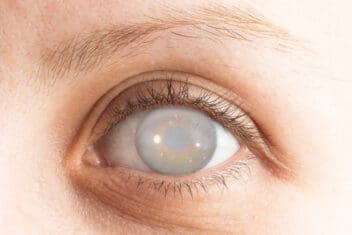Guide to Cataracts and Dizzy Spells: Before and After Cataract Surgery
Last Updated:
Cataracts are known to cloud, blur, or obscure vision, but can cataracts cause dizziness? The impairment of vision associated with cataracts can affect balance, potentially resulting in feelings of unsteadiness or dizziness.
Table of Contents
Poor vision and double vision are common symptoms of cataracts. These issues may make you feel off balance because you cannot see well.
Dizzy spells after cataract surgery are rarer. If you do experience dizzy spells after cataract surgery, this is usually part of the adjustment period to the new artificial lens because you can see better as the lens refracts light more clearly.
It can take years before you need cataract surgery. If you do not experience frequent dizzy spells, there are steps you can take to see better and reduce your risk of feeling unstable or falling.
What Is the Link Between Cataracts & Dizzy Spells?

Cataracts have been linked to episodes of dizziness.
Feeling lightheaded, off-balance, and like the room is spinning or moving are symptoms of dizziness. This experience happens to everyone at some point, but if you experience dizzy spells very often, it could mean you have an underlying condition. You may also have other symptoms along with a dizzy spell, like double vision, a ringing sound in your ears, feeling your face or arms go numb, or feeling nauseated.
You deserve clear vision. We can help.
With 135+ locations and over 2.5 million procedures performed, our board-certified eye surgeons deliver results you can trust. Your journey to better vision starts here.
You may have problems with muscle weakness, circulation, your inner ear, or your eyes that can lead to dizziness. Dehydration or low blood sugar, migraines, and heart problems can all cause dizziness. If you experience these issues in addition to cataracts, your chances of dizzy spells are increased.
What Might Cause These Dizzy Spells?
There are a few potential reasons that cataracts can cause dizziness or imbalance. These include:
- Poor vision. Being able to see well allows your brain to process images of the world around you, so you can judge distances and the sizes of objects much better. When you cannot see clearly, you may not be able to predict how large or close something is, which can throw you off balance.
- Double vision. Cloudiness in the lens can cause light to enter your eye in different directions, hitting your retina so that the image sent to your brain appears doubled. If double vision is severe enough, you will have trouble navigating the world because you cannot see where objects are. This may make you feel unstable.
One study on older adults who had undergone cataract surgery found that although they did not experience dizziness as much, they still experienced falls at the same rate as prior to the surgery. For people who have cataracts that make them experience dizzy spells or feel unstable, removing these can help with overall confidence. For older adults, falling is also common as muscles and joints become weaker, so this problem suggests that the underlying issue is not feeling dizzy.
The study reported that there were more falls in older adults who wore multifocal glasses, like bifocals or trifocals, after cataract surgery.
For the older adults who wore multifocals sometimes, but not consistently, falling was more likely. Researchers suggested this means the brain is still struggling to interpret the world based on visual images, although the person believes they can see very well. They also suggested wearing single-power lenses instead of multifocals, except for some specific tasks like reading.
Your doctor, optometrist, or ophthalmologist can help to diagnose cataract-related dizzy spells and rule out other conditions. The main way to diagnose cataract-involved dizziness is for your doctor to dim the lights in the room and have you walk.
You deserve clear vision. We can help.
With 135+ locations and over 2.5 million procedures performed, our board-certified eye surgeons deliver results you can trust. Your journey to better vision starts here.
Dizziness After Cataract Surgery
If you experience dizziness or more frequent dizzy spells after cataract surgery, this may be part of your eye’s healing process.
For the first few hours after surgery, you may experience dizziness due to the anesthetic eye drops or because your eye is still in the early stages of recovery.
If dizziness persists, or remains frequent for days or weeks after the operation, this still suggests your eye and brain are adjusting to your new vision. You were accustomed to how the cataract refracted light into your eye, so you may need time to adjust to the power of the new artificial lens.
In rare cases, dizziness can indicate damage to part of your eye caused by the surgery, or it could indicate another underlying problem. Report this symptom to your ophthalmologist and general practitioner, especially if there are other associated symptoms like nausea.
How to Manage Cataract Symptoms
If you have cataracts that significantly obstruct your vision, your ophthalmologist or optometrist will recommend surgery. However, most people have cataracts for 10 or more years before receiving this diagnosis.

In the meantime, there are some steps you can take to manage cataracts and reduce how often you experience dizzy spells.
- Use brighter lights in your home or at work.
- Wear anti-glare sunglasses.
- Use a magnifying glass or prescription glasses to help with up-close work like reading.
- Get updated glasses or contact lenses to improve how light is refracted into your eye.
The most important step is to get regular eye exams. Your ophthalmologist or optometrist will follow the progression of your cataracts and note any symptoms that you report to them. This will help them determine when to recommend surgery.
People develop cataracts around 60 years old, on average. About half of American adults have had cataract surgery by 80 years old, showing how slow the progression of cataract development is.
You deserve clear vision. We can help.
With 135+ locations and over 2.5 million procedures performed, our board-certified eye surgeons deliver results you can trust. Your journey to better vision starts here.
References
- Dizziness. (April 2020). National Health Service (NHS).
- Dizziness (Lightheadedness). (February 2020). NHS Inform.scot.
- Cataract Surgery Lessens Patients’ Dizziness. (November 2015). Science Daily.
- Seven Symptoms of Cataracts. (September 2017). Healthline.
- Patient History Most Important Factor in Diagnosing Dizziness. (September 2006). Medscape.
- Why Do I Have Balance/Dizziness Problems After Cataract Surgery? (August 2016). American Academy of Ophthalmology (AAO).
- At a Glance: Cataracts. (August 2019). National Eye Institute (NEI).
This content is for informational purposes only. It may have been reviewed by a licensed physician, but is not intended to serve as a substitute for professional medical advice. Always consult your healthcare provider with any health concerns. For more, read our Privacy Policy and Editorial Policy.